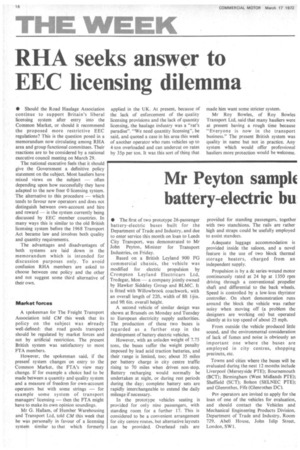RHA seeks answer to EEC licensing dilemma
Page 18

If you've noticed an error in this article please click here to report it so we can fix it.
• Should the Road Haulage Association continue to support Britain's liberal licensing system after entry into the Common Market, or should it recommend the proposed more restrictive EEC regulations? This is the question posed in a memorandum now circulating among RHA area and group functional committees. Their reactions are to be considered by a national executive council meeting on March 29.
The national executive feels that it should give the Government a definitive policy statement on the subject. Most hauliers have mixed views on the subject often depending upon how successfully they have adapted to the new freer 0 licensing system. The alternative to this procedure — which tends to favour new operators and does not distinguish between own-account and hire and reward — is the system currently being discussed by EEC member countries. In many ways this is similar to the old British licensing system before the 1968 Transport Act became law and involves both quality and quantity requirements.
The advantages and disadvantages of both systems are laid down in the memorandum which is intended for discussion purposes only. To avoid confusion RHA members are asked to choose between one policy and the other and not suggest some third alternative of their own.
Market forces
A spokesman for The Freight Transport Association told CM this week that its policy on the subject was already well-defined: that road goods transport should be regulated by market forces and not by artificial restriction. The present British system was satisfactory to most Ff A members.
However, the spokesman said, if the present system changes on entry to the Common Market, the ETA's view may change. If for example a choice had to be made between a quantity and quality system and a measure of freedom for own-account operators but with some strings — for example some system of transport managers' licensing — then the FTA might have to make its own opinion soundings.
Mr G. Hallam, of Humber Warehousing and Transport Ltd, told CM this week that he was personally in favour of a licensing system similar to that which formerly applied in the UK. At present, because of the lack of enforcement of the quality licensing provisions and the lack of quantity licensing, the haulage industry was a "rat's paradise". "We need quantity licensing", he said, and quoted a case in his area this week of another operator who runs vehicles up to 4-ton overloaded and can undercut on rates by 35p per ton. It was this sort of thing that made him want some stricter system.
Mr Roy Bowles, of Roy Bowles Transport Ltd, said that many hauliers were at present having a rough time because "Everyone is now in the transport business." The present British system was quality in name but not in practice. Any system which would offer professional hauliers more protection would be welcome.










































































































